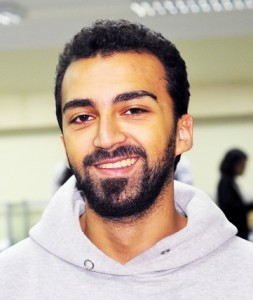While writing is an individual task, the production of a newspaper is very much a team effort. Over the past several months the Daily News Egypt has worked to establish a business, a public identity, and an honest check on Egyptian politics and society. This effort reinforced the adage of Irish revolutionary Bobby Sands who said, “everyone has their own particular part to play.”
Some of us have a knack for finding sources, some have a way with narrative and composition. We provide each other translation help and technical assistance. Throughout the day facts are checked and discussions are held over the low, transparent cubicles that separate our work space, but also encourage us to work together.
Then early the next morning, the broadsheet is printed and distributed.
Below are the stories of five reporters offering a unique and insider’s perspective on their experiences.
Trial by fire: learning on the job as a rookie reporter
By Joel Gulhane

Coming in to the newsroom as a newbie is not something that can be done with a “softly-softly” approach; the lessons are learnt on the job. The endless phone calls, adapting to a new style of writing, and the pressure of the deadline necessitates a jump straight into the deep end and there definitely is no time to complain.
One of the first lessons I learnt was to never assume a story that you find, is true. One such instance occurred when I saw a story on a news website (which shall remain nameless) announcing the arrival of a Hamas delegation in Cairo for high level talks with government figures. An interesting story I thought, but not a confirmed source. The day was spent attempting to confirm the story and gain fresh information. After being passed from one department to another, I finally got through to the prime minister’s office and was told, “there is no Gaza delegation coming to Cairo today.” Story killed and most of a day wasted.
Another lesson that has proved to be useful is to take a bit of time for background research on the details, you never know what you might find. The workers at Sokhna Port had closed the docks for almost 10 days and two ships were effectively being held hostage. An administrator claimed that the port was to be blacklisted by the International Maritime Organisation unless it re-opened. A little digging around the IMO website revealed that there is no such thing as a blacklist in the IMO. The IMO confirmed this. It appeared to be pressure tactics by the owners of the port to end the strike. Many other news agencies had run with the story assuming that this threat was true. Proving it to be false was a good feeling. We had a unique angle on the story.
I have come to enjoy how much some people appreciate it when you tell their story. One such case was the month long sit-in when Marsa Matruh was calling for a new governor. While speaking to people involved in the sit-in I could hear the desperation in their voices as they described the issues they wanted to be addressed.
It was not until I met these men face-to-face in Cairo that I really understood how grateful they were. A group had come to protest outside the presidential palace and I went to meet them. They all shook my hand and thanked me. They told me how much they appreciated me taking an interest in their story. It goes to show that however small a story might appear, it probably means a lot to somebody.
Being the newbie in the newsroom has not been easy, but even when it gets stressful, it’s still exciting. The great moments outweigh the bad moments. I found it difficult not to feel like an excited child when invited to the Ministry of Foreign Affairs. I was left in awe after attending a joint press conference held by the Russian foreign minister, Sergey Lavrorv, the secretary general of the Arab League, Nabil El-Araby, and joint UN-Arab League special envoy to Syria, Lakhdar Brahimi. I had gone from seeing these people on television to bumping in to El-Araby on the way out of the press conference. A big jump from the sofa, if you ask me.
Frequently underestimated never dishearted
By Nouran El-Behairy

I’m always running, usually with a side bag, through the busy streets of Cairo, a notebook in one hand and a camera in the other. This time I was in a hurry to get to a protest by retired military personnel. I was anticipating how the event would go and wondering if I would meet interesting people, get a scoop, or even enjoy some action.
After a lot of running and almost dying twice between the racing cars, I finally got to the protesters and started asking questions.
“We will not talk to the press” a protester said. Since I’m used to this sentence I didn’t lose hope. I approached other protesters but their comments were even stranger.
“What is a girl like you doing here?” an old protester said.
“I’m a journalist and I’m here to cover your story” I replied.
“You mean you are here to take our words and twist them. And besides, don’t they have men in your newspaper?” he said.
While many Egyptians see journalists in a negative light, as opportunists trying to get a scoop at any expense who stir the public through sensationalism, it is worse for a female journalist. On the societal level, she’s criticised by a large sector of people who claim that reporting is a dangerous job for women, requiring long working hours and risk taking, lessening her chances of getting married.
On the professional level, she is often underestimated, as the protester did me. She is vulnerable to harassment during news coverage, sometimes even from sources. Some Islamists refuse to talk to a female reporter because a woman’s voice is awrah and shouldn’t be heard by a strange man.
On the other hand, being a young female journalist never got in my way when I covered press conferences. Sometimes it actually helped.
Press conferences can be either quite boring or quite fun, either way it’s a part of any journalist’s daily schedule. Every day there’s a press conference announcing, denouncing, or explaining stances.
The first press conference I covered was for Maspero Youth Coalition. I sat in the second row looking around and recognising faces like that of George Ishak and Mostafa Al-Guindy, and there were others who seemed rather important.
I was one of the very few women in the conference and probably the youngest attendee, as most were middle-aged. I was nervous, but everybody who passed by my chair looked at me and smiled, this time they seemed sympathetic and some even looked proud.
One press conference I’ll never forget was by the Egyptian Students’ Union, who mostly belong to the Muslim Brotherhood. Some of the attendees, especially girls, gave me strange looks. I thought it was maybe because I’m not veiled, but that didn’t stop me. I asked the ushers questions and they were very helpful.
The conference ended in chaos though when the students’ union board wrapped up without giving journalists the chance to ask questions. I dare to say the hall witnessed a mini press revolution; journalists were standing on their chairs yelling and chanting against the speakers. Even when they were forced to leave the room they carried on fighting for “their right to question,” with the chants led by two female journalists.
Journalism: The fourth authority or a living tragedy?
By Fady Salah

In addition to the executive, legislative, and judicial authorities, some perceive journalism as the fourth authority of the state. Journalists are responsible for monitoring the performance of the three branches and exposing them to public opinion. Journalism and media have the potential to serve as sounds of truth, enhancing the transparency and accountability of society.
If journalists provide such an important role for Egyptian society, how does Egyptian society treat journalists in return?
This November, well after the revolution, I parked my car on the pavement of Al-Gama’a Bridge. While trying to relax and enjoy the sight of the Nile, I heard a knock on my window. It was a police officer. He checked my driving license and treated me surprisingly well. He then asked to search my car and suddenly his attitude changed dramatically.
“I see you have lots of books and newspapers in there. What do you do?” he asked. I responded that I was a journalist. He began to write a ticket for parking in an un-allowed area, and said, “I bet you’ll try and expose me for writing you this.”
Protesters also have the feeling that journalists are their enemies. They perceive our questions as threatening, and most of the time do not give honest answers.
The corrupt are afraid of journalists because they might investigate and expose their corruption, while others simply perceive them as parasitic creatures seeking to acquire confidential information.
Such attitudes are inherited from the former era of dictatorship, which perceived journalism and media as a threat. Accordingly, the dictatorship spread stereotypes about journalists, which eventually led to the current situation.
Historically, undermining journalism and spreading false stereotypes about journalists were effective methods of manipulating the masses. As the German propagandist Joseph Goebbels put it, “if you tell a lie big enough and keep repeating it, people will eventually come to believe it.”
The phobia of journalists reaches its peak when you approach a source, and tell him or her that you are working for Daily News Egypt: an English newspaper. It drives people to treat us as if we were spies working for the intelligence body of their enemies. We can always feel the suspicion of our sources once they hear the word “English.” Explaining that we are in fact Egyptians, working for a truly independent Egyptian newspaper is something we need to clarify in almost every conversation we have with sources.
We might be swimming against the tide, treated as parasites, but no matter what, we will keep digging: the truth needs a true fighter to reveal it.
Struggling for objectivity in a subjective world
By Luiz Sanchez

As journalists, one of our biggest challenges is remaining detached from the stories we cover, but more often than not a good journalist will immerse him or herself into a specific topic with some personal meaning to them. The longer we cover a specific issue or cause, the more attached we can grow to these topics. Yet, a question we all must ask ourselves is how involved have we become?
Last year I covered several protests in and around Tahrir square, where protesters demanded the army keep their promises of reform, elections and a constitution. The more I was on the streets, the more I found myself sympathetic to their cause, chanting snippets of the slogan under my breath, yet mindful of my disconnect with the people. “I am a foreigner, this is not my fight, I am here to do a job,” became my mantra.
On 19 November, in the aftermath of the largest protest Egypt had seen in over six months, police surrounded the square in an overwhelming display of force. I had been sitting in a tent with a few activists who had spent the night in the square, when a young man entered our tent and told us, with a look of sheer terror on his face, to “prepare for battle.”
Shields raised and batons at the ready the police charged the tents, demolishing everything in their wake and beating protesters into submission with the help of civilians sympathetic to the police.
I found myself immersed in the thick of things the following few days. At first I had my pen, paper and a pathetic excuse for a camera handy. By the second day I committed the events to memory rather than stop and write. By the third day I had disregarded the camera, hoping to absorb the full spectrum of the conflict, knowing my camera could not capture it. I was committed to the story, but I was ultimately also committed to the cause. I wanted to help, but had to be sure to do so in a way that would not run against journalistic ethics.
I had become emotionally invested, having seen people die or dying, and children flinging rocks at men armed to the teeth who responded in kind with buckshot. Only a monster could be unmoved.
As the days rolled by I met many friendly activists who were interested in having media tag along. Some had brought molotovs to the square, others came with nothing but their fists and voices. One jokingly asked if I wanted to hold a flaming molotov, “tempting, but no.”
My level of attachment grew to the point where I found myself in increasingly dangerous situations, by mere happenstance I managed to come out of every scenario relatively unscathed.
At what point do we draw the line between activist and journalist? Was the line crossed when my friends and I decided to supply the field hospitals with medicine?
Some may say so, yet to me a journalist is at their best when they are to some degree emotionally invested in their subject matter. With this attachment also comes a distorted sense of perspective that can lead to putting oneself in danger. Striking the balance between commitment and safety allows for quality reporting.
The other side of the story
By Rana Muhammad Taha

The abc in journalism is producing balanced stories. Finding someone eager to share a newsworthy story with you is not even close to getting it done. You need to keep it balanced by checking out the other side. And in a country where the concept of free flow of information is almost non-existent, you’re left at the mercy of the “other side’s” whims. And if that other side happens to be a governmental office; then it’s not a question of whims as much as it’s one of bureaucratic sloth.
Governmental offices’ work strategy seems twofold; they’re trained to pass you from one line to another under the myth that you’re being transferred to the person who’d be able to answer your question best. When you finally reach the person who does hold the key to your question, they deal with the little information they have as if it’s some sacred treasure they’ve sworn to take to their grave.
I was once doing a story on the air stewards’ strike and I had to find out whether it had disrupted the airport flights. The story had me on hold and being hung up on the whole day as I tried to get through to anyone officially speaking on behalf of the airport management. I ended up with an unbalanced story with the classic words of “the airport administration could not be reached for comment.”
Yet, getting through to the airport authority is a picnic when weighed against trying to get any articulate phrase from the Ministry of Interior. A phone interview with the Ministry of Interior’s spokespeople is the worst form of oppression a journalist could face. They have the incredible power of seeing the innocent way you greet them as a trap you’ve set up to find them at fault. Any question you ask, regardless of the way you phrase it, to them makes absolutely no sense at all. And if they start making any sense of it, it miraculously it turns into an offensive question, which has you busy dodging their defensive responses.
Even when you steer clear from governmental offices, balancing out your story doesn’t get any easier. One of my ugliest moments with a source was when I was doing a story about those killed in the Maspero Massacre. Their families released a statement denouncing the Maspero Youth Union and accused them of collecting donations on behalf of the Maspero massacre victims without transferring the donations to the victims’ families.
I had to call the union’s media representatives to get “their side of the story.” At my last question, the representative suddenly started yelling at me. She asked me why I was interrogating her. She addressed me with rudeness, which surpassed that which the Ministry of Interior’s spokespeople use.
Be it obstinacy to release a statement, the lack of acknowledgement of the concept of the flow of information, or a defensive attitude, the result is you are faced with a greater challenge in balancing out the story.




